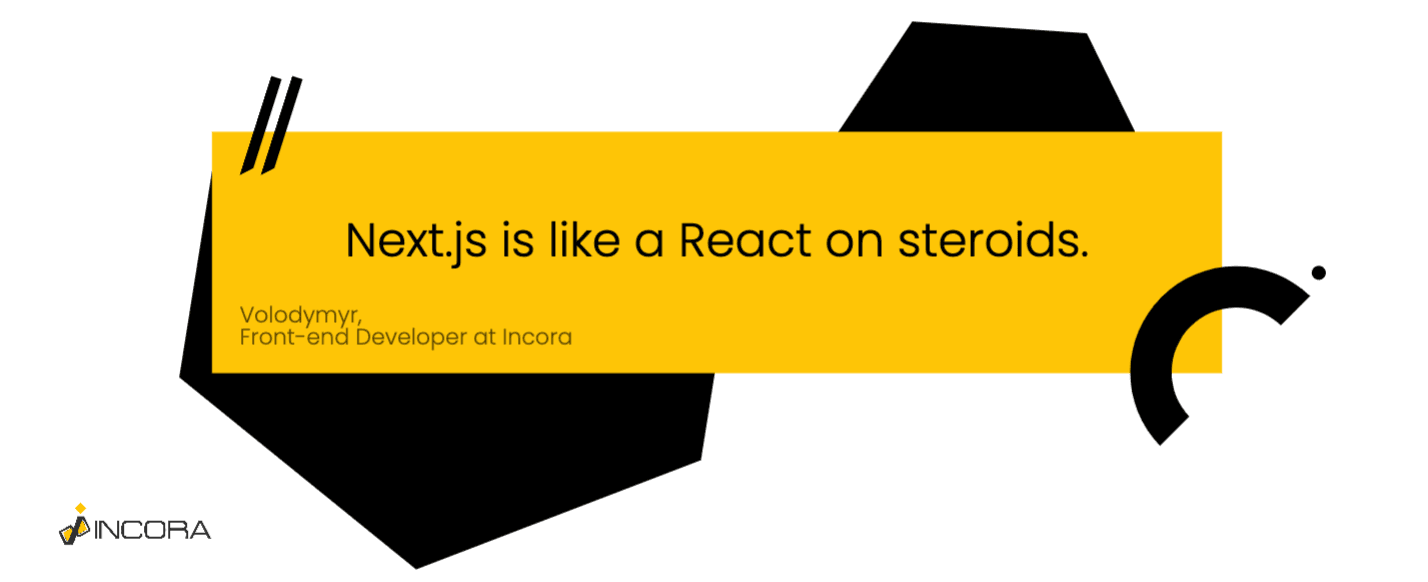What are the Top Future Frameworks? - We asked a Full-Stack Developer
October 12, 2022 • 974 Views • 24 min read
Bohdan Vasylkiv
CEO & Co-Founder
When we are thinking of frameworks or other topics that are related to software development, we can easily name at least a few various facts about them. However, if you google “Top Software Development Frameworks” or will try to predict the best future frameworks, most likely you will get confused. As a matter of fact, all related information is very contradictory and there is no actual single answer to such questions.
Therefore, we believe, that there is no better way to find out the truth than to ask the experts. So, we asked the most interesting and ambiguous questions to one of our Full-stack developers, hoping to learn his vision for the future of software development frameworks.
Framework vs Library
Framework or Library: What has more advantages and more significant potential?
First of all, it is worth distinguishing not only frameworks from libraries but understanding that they also vary by the field of development.
Talking about the comparison between Framework vs Library, the answer is - Framework and Library and pure code. Each technology has its own pros and cons. Therefore, to make a correct choice, the developer has to spend some time researching the future project. There is a variety of various aspects, and each of them can influence the final choice.
When it comes to the main differences between them, there is no actual all-in-one answer as well. The only thing we can do in such a case is to shape the major characteristics.

Libraries are, in fact, compilations of code structures and units. Libraries are an additional tool to save developers time and effort, enabling various features and functions. Yet, the main advantage of libraries, comparing them to frameworks, is that they are still very flexible and unstructured. In other words, they allow developers to skip some coding aspects and import ready-to-use tools into the program instead. Nonetheless, these are only standalone parts of the overall functionality, so developers still have to combine them and build the code structure by themselves.
On the contrary, Frameworks can be considered “libraries on steroids”. Apart from ready-to-use elements, this technology has its logic and structure, which the developer must adhere to. On the one hand, frameworks are less agile. On the flip side, they are more reliable and standard. Thus, it would be easier for newcomers or other developers to join or analyze the application logic on the code level. Alternatively, it is much harder to make mistakes or create issues while coding.

As a result, we can say that both technologies are great and it is impossible to state which one is better as a general assumption. However, if you consider both of them in the context of a specific case, it would be oblivious for you to figure out which one is better. For instance, sometimes it is even easier and faster to simply use a pure programming language without any other superstructures. In other words, there is no such thing as “the best framework/library”. Everything depends on the context. Each solution may be a perfect or the worst choice in various conditions.
What Frameworks/Libraries Do You Prefer and Why?
As a Fullstack developer, I work on the backend, frontend, and mobile app development. Recently for backend development most often I used Nest.js. Additionally, in some cases, I created everything from scratch using only native Node.js modules without any libraries or frameworks. Talking about frontend development, for creating websites I used Next.js and React.js. Finally, a mobile application is based on React Native.
To sum up, I have tried a lot of the tools, related to JavaScript. I used different old technologies and now I mainly work with modern ones. As was mentioned before, the tech stack depends on the project’s needs, not the developers’ wishes. Answering your concrete question: I have no actual preferences, but I highly believe it is worth knowing how to deal with various tools and technologies.
However, I suppose it is also possible to shape some recommendations:
-
If your project is a website and you are willing to make it successful, make sure it is indexed, and SEO is important - then Next.js is a preferable solution. It is like “React on steroids”, meaning that it is almost the same as React, however, it proposes Server-Side Rendering to adjust it for better Search Engine Optimization. But if you are creating for example an admin panel for internal use React.js will be enough for this.
-
Alternatively, if my task is to set up a project and leave it for less experienced developers, then, maybe, it would be better to choose Angular. This popular framework is based on TypeScript, is more structured, and won’t allow deviating from the framework limitations.
-
Finally, if the project is not complex, and is required to provide only a few functions, like browser extensions, then I would probably use pure code because it would be easier and faster than using libraries or frameworks.
Frankly speaking, the wide variety of cases and examples is enormous, therefore only thing I can state and recommend - everything depends on the specific requirements of the project, the possibilities of the customer, available resources, the experience of team members, etc.
How to make the right choice? What should developers/clients consider while choosing a framework?

How many resources do we have? Answering this question will help to narrow down the list of possible technologies, find out how experienced a team it is possible to assign, how many team members it is possible to attract, etc. It is clarifying question, that helps to better plan the overall work and to figure out the real situation, and think over a work plan.
How experienced team do we have? this question is also a clarifying one. It helps to choose the correct tech stack, which will be preferable for the team and result in better outcomes.
The variety of additional aspects is too wide to list all of them. For instance, it is possible to predict the scale of actuality, popularity, and even approximate period of operation, the application logic, etc. All these additional aspects are related to various fields and sides of the development process. For instance, you should also consider how to optimize your app’s performance.
Afterward, it is worth comparing. Clearly, all the foregoing questions and answers will narrow the number of possible tech stack options. Yet, evidently, there will be no single option. Most likely, your team will have a list of a few various popular frameworks and libraries, which meet all the previously established requirements. Therefore, to make a final choice you will still have to discuss it with your team. Therefore, you will have to compare them, in order to understand which one is the best choice for your specific case. You will have to take into account the abilities of your team as well. For instance, you may find an ideal full-featured framework for your project, yet if there are no people, who can use it - probably, you will have to find an alternative or other developers.
Aspects Worth Considering?
Add-ons and extensions: Which frameworks are the most “customizable”/agile? Is it important?
Indeed, it is important. Mostly, these add-ons help to get rid of routines, allowing developers to switch to more important and complex tasks. Moreover, the customization option highly increases the use cases and can enable various features.
For instance, React Native would be less popular and effective and simply without all libraries created for them. The reason is simple: most of these add-ons and libraries propose an easy way to implement a complex solution or feature.
The only issue, you may struggle with, in the context of add-ons and packages, is their variety and trustworthiness. Doubtless, the number of premade code samples and packages differs, depending on a framework, its popularity, time on the market, overall quality, etc.
Additionally, it must be said, that before using such ready-made features, you should examine whether they are not harmful. It is very easy to find harmful packages, which may be both low-quality, and possibly result in various issues like performance degradation, or simply be harmful or spying software, which is published as free open source in order to get access to confidential data, etc.
Are there any other aspects, that can impact the progress/effectiveness of the framework within the project?
Apart from obvious aspects like programming language and the framework capabilities, it is hard to define other additional aspects. At the moment, the efficiency of computers is enough to perform at the same level of productivity with different frameworks and libraries.
The only reasons, that can really affect the effectiveness of the framework are so specific and rare, that they are mostly the exception to the rule than the rule itself. For instance, sometimes there is a need to support outdated not supported frameworks due to some conditions. Clearly, this will affect the overall productivity of the project.
Poor code also impacts the effectiveness, yet it is fair to any framework, and the problem lies in the inexperienced software development team rather than the framework itself. Low-quality and not powerful enough hardware is also the possible reason, yet it is also not relevant to the specific framework, but rather the insufficient resource base.
What is the role of the programming language, a framework is based on?
Remember the scheme from the very beginning? It is the fast and most obvious answer to your question. Doubtless, if the code, which is a basis for a full-featured framework or library, is incapable to do something, the framework/library won’t be able to do so as well.
Programming language is always the most essential aspect of each software development. However, programming languages are also constantly improving, meaning that their capabilities are also expanding. Additionally, programming language also may have its own use specifics, which, accordingly, extend to the framework. For instance, TypeScript uses strict typification. As a result, frameworks, based on this language also require a strict approach. Frankly speaking, it is worth admitting, that TypeScript is not actually a programming language or framework but rather a superstructure, based on JavaScript.
Alternatively, languages may expand or narrow down the functionality of the framework. For example, it is impossible to develop real-time systems with the use of Node.js or JavaScript, because of the built-in garbage collection function. Therefore, the answer is yes, a programming language can and does impact the functionality of the application or popular framework. In other words, programming language defines all the possibilities and limits of all products, based on it.
General Situation In The Industry
What is the modern state of the Market? Are there any tendencies?
Frankly, there are a lot of various instruments on the market, that are actively developing, upgrading, and expanding their audience. For instance, among the backend frameworks, we can highlight Nest.js. It is a popular framework, based on TypeScript and is constantly being improved.
For instance, its developers have recently fixed a lot of various issues. From the very beginning, there were a lot of unpleasant aspects, if we are talking about the backend JavaScript development. It is still possible to find some servers, based on Express, that regularly struggle with Middleware. On the flip side, Nest managed to formalize. As for me, I prefer to use Nest in combination with Fastify, instead of Express.
Alternatively, backend development, based on the JS has progressed a lot recently. In fact, it is possible to develop a full-fledged backend server with the use of pure Node.js, without using any additional frameworks. On the flip side, the validation process will be very demanding and problematic, due to the fact, that far not all developers are capable to understand the structure of such a project, as well as other aspects related.
This is why it is preferable to use Nest for these purposes. Thanks to the number of people who are able to understand and manage your work due to the great Nest.js documentation and the ability to learn it. It won’t be a secret if I will tell you that the number of people who knows how to deal with Nest is bigger than the ones, who can operate Nest.
Talking about additional tendencies, it is clear that in the distant future React projects will probably migrate to Next.js because it not only provides all its features but proposes additional and very useful and important functions as well. Moreover, Next is regularly and actively improving and expanding.
Yet, it is also obvious, that React won’t disappear, because it is still a powerful instrument. Besides, the improvement of Next is also extending to React, because it is the main basis of the framework.
Are there any crucial frameworks, that impacted the overall market?
Talking about the overall history, then it is possible to name JQuery, which resulted in the popularization of JavaScript. Afterward, a wide variety of libraries and frameworks, based on JavaScript appeared and changed the general idea of software development and programming, as well as the role of JavaScript in them.
In more recent and specific cases, it is impossible to underestimate the role of React, Angular, Vue, and Redux in the context of front-end development. Express highly impacted the backend, at the moment Nest.js is becoming one of the most important elements in this field. React Native, obviously, impacted mobile development.

What makes the framework outdated/irrelevant/ineffective?
The most obvious and simple reason is that creators stop supporting the framework, they have created. Most frameworks are free and delivered with open-source principles. Clearly, most framework designers have their own interests in developing and supporting such products. Framework development is not an easy one-day task. It is a complex and constant process.
In fact, developing a framework is just one of the first steps in this field. Far more resource-intensive and important is to ensure regular updates, which include bug fixing and new features, or use cases possible. Undoubtedly, the IT industry is constantly changing, therefore it requires to keep up with these changes. If your product won’t be improving, most likely it will be replaced by an analog or its competitor.
Another way how the framework may become outdated is if it proposes old-fashioned solutions, which are rare among the software development trends. Of course, we are not talking about various particular cases, that have limited and unique us. These specific frameworks may exist for a very long time in such conditions. Yet, if we are talking about the common software development trends, then it is fair to assume, that innovations or rapid and radical changes may result in the irrelevance of the framework.
However, sometimes this rule may not work. For instance, due to this logic, Next.js should have brought death to React. Yet, both of them are still relevant and have a future. On the one hand, a lot of React-based applications, as well as developers, switched to Next thanks to the additional features it proposes.
On the flip side, the React community is still very strong and publishers regularly update their products. Moreover, the number of various add-ons and extensions for React still increases, which shows that React is still relevant.
Also, it is worth admitting, that React and Next are not direct competitors. React is a library, while Next.js is a framework. Thus, they belong to slightly different fields of software development. Frankly, there are some additional aspects like performance, trustworthiness, security, complexity, etc. Yet, they are not as essential as previously stated reasons.
What is the best framework for newcomers, who just started their path?
I highly believe, that the best way to learn how to code - is to combine learning the code basics and frameworks, or libraries at the same time. Knowing the code basis is a more preferable choice because it allows us to better understand the working principles of all related products. Yet, parallel studying allows faster become a developer.
However, it is worth admitting, that the list may vary. Specifically, this one is based on my own experience. I am experienced in these technologies, as well as other JavaScript-related solutions. Yet, these technologies are a great choice both for newcomers and experienced developers, because of the multiple ways to use them and the solutions they provide.
Also, they are easy to learn. For example, knowing how to deal with React, developers can switch to React Native, Next.js, etc. Of course, each of them has its own specifics and requirements but the main logic and tools are the same for all of these frameworks.
End Line
We hope this short question-answer article helped you and answered all of your questions or, at least, most of them. Frankly speaking, despite the experience of our developer and the fact that he had an opportunity to work in all possible fields of software development, it is worth admitting, that all the foregoing is just a subjective and humble opinion of a single person.
Clearly, someone may deny the given theses. Yet, we tried our best to support each statement with facts and arguments in order to make this article as correct as possible. Nonetheless, if you have something to say or any questions, we have not answered - you are welcome to contact us.
What’s your impression after reading this?
Love it!
1
Valuable
1
Exciting
1
Unsatisfied
1
FAQ
Let us address your doubts and clarify key points from the article for better understanding.
YOU MAY ALSO LIKE
Let's talk!
This site uses cookies to improve your user experience. Read our Privacy Policy
Accept
Share this article